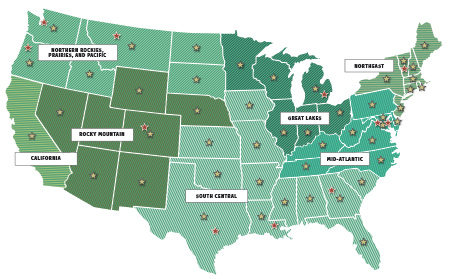Mosquito spraying harms pollinators and other wildlife—but there are safe alternatives.

A Culex nigripalpus mosquito (left) feeds on a mango flower. (Photo by Lawrence Reeves, Florida Medical Etymology Laboratory)
EVERY YEAR, MILLIONS OF MONARCH BUTTERFLIES migrate south, riding air currents for up to 3,000 miles from the northern United States and southern Canada to central Mexico. But late last August, thousands of monarchs crossing the Midwest on their epic journey ran into a cloud of the insecticide permethrin—and perished. The insecticide had been sprayed from a plane by a government agency charged with controlling mosquitoes in the Fargo–Moorhead area of North Dakota and Minnesota. Yet permethrin, along with other pyrethroid products, also is frequently used by mosquito-control companies that spray residential backyards across the country.
Most of these businesses claim that their treatments kill only mosquitoes and other insect pests. “But without a doubt, spraying your yard for mosquitoes will harm other insects,” says National Wildlife Federation Naturalist David Mizejewski. “The broad-spectrum insecticides used in commercial applications kill many bees, butterflies, moths, caterpillars, dragonflies and ladybugs.” And the damage does not end there. Birds can also die, especially nestlings, when their insect food disappears. Fish and other aquatic organisms can succumb when the pesticides end up in nearby ponds and lakes, he says.
Yet Mizejewski also realizes that keeping mosquitoes at bay can be vital. In times past, these insects were primarily just a nuisance. But as climate change extends the range of many mosquito-borne tropical diseases—including Zika virus, West Nile virus, Chikungunya virus and dengue fever—the risks to humans are mounting. West Nile virus, which arrived in North America during the late 1990s, for example, kills between 100 and 200 people a year in the United States and Canada.
Still, “there are alternatives to pesticides,” says Mizejewski. He and other experts recommend several strategies for protecting yourself and your family—while safeguarding beneficial insects, birds and other wildlife.
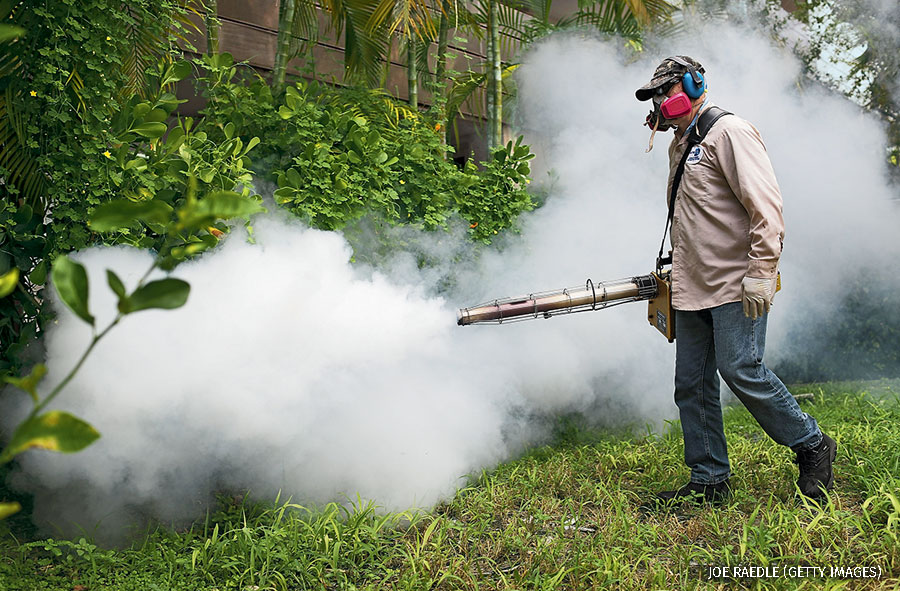
A worker sprays insecticides to control mosquitoes in Miami.
“Finding the source of your mosquitoes is critical,” says Aimée Code, pesticide program director for the Xerces Society for Invertebrate Conservation. “Many mosquitoes can lay their eggs in just 1 inch of water. You may have thousands of them breeding in your gutters.” One way to keep gutters clean, she says, is to install a screen on the top to keep leaves from piling up and retaining water.
David Brown, technical advisor for the American Mosquito Control Association, says that some mosquito species can successfully lay eggs in just a bottle cap filled with water. He recommends keeping track of anything and everything that can hold water, including children’s pools, pet bowls, flower pot saucers and watering cans, and also to check unexpected places such as leaking faucets and adjacent puddles. And don’t forget your bird bath. The water should be completely dumped out and changed at least every two to three days.
In his latest book, Nature’s Best Hope, Doug Tallamy, a University of Delaware entomologist, suggests placing a 5-gallon bucket in a sunny location in your backyard. Throw in some straw or hay and wait a few days. He says gravid female mosquitoes will find it irresistible and lay their eggs in the container. You can then add a “mosquito dunk” that contains Bacillus thuringiensis israelensis, or Bti, a natural bacterium that will kill the larvae when they hatch. If you have a pond or large water feature that cannot be drained, that’s also a good place to use Bti. Because female mosquitoes avoid laying eggs in moving water, another option is to add a pump or fountain to your water feature.
Avoid introducing mosquitofish into a pond if they are not native to your part of the country. These small fish may devour mosquitoes, but they can also displace native minnows that do an equally good job consuming mosquito larvae. Other deterrents to avoid, says Brown, include ultrasonic devices, which don’t work, and bug zappers, which kill very few mosquitoes but are proficient at dispatching beneficial insects such as moths and fireflies.
Likewise, experts discourage hiring companies that spray with essential oils such as lemongrass, rosemary, peppermint and other botanicals to control mosquitoes, because such products also may kill nontarget insects. Code notes that it takes longer for bees and other beneficial insects to bounce back from the impacts of pesticides, even natural ones, while mosquitoes are quick to recover.
To protect yourself from the pests, “make sure to wear long-sleeved shirts and long pants or use a repellent,” says Code, especially if you are out in the early morning or late evening when mosquitoes are most active. While some people prefer to steer clear of chemical repellents, the products do work well.
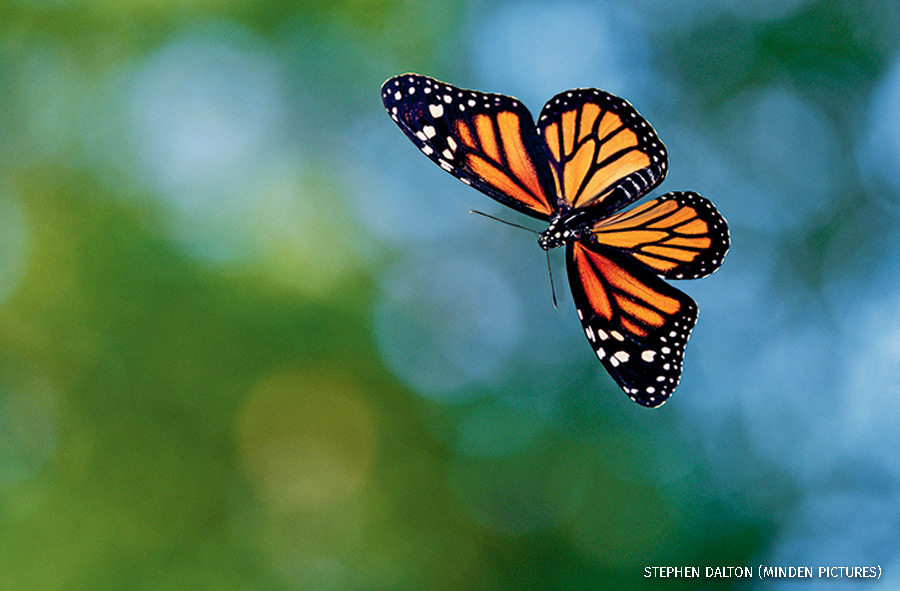
Aerial spraying was linked to the death of thousands of monarch butterflies last summer.
The Centers for Disease Control and Prevention (CDC) recommends a repellent with one of the following active ingredients: DEET, picaridin, oil of lemon eucalyptus, para-menthane-diol (the synthetic version of oil of lemon eucalyptus), IR3535 (found in Avon’s insect repellents) and 2-undecanone (a natural chemical found in many plants). While the U.S. Environmental Protection Agency has registered all of these repellents for their safety, it’s a good idea to avoid the potential overuse of any chemical products. According to the CDC, repellents should not be applied near the eyes or mouth and used only sparingly around the ears. There’s no need to spray skin under clothing. If you are also using sunscreen, apply it first and the repellent second. Wash off treated skin when you go back inside.
Jason Pitts, a mosquito researcher and assistant professor of biology at Baylor University in Waco, Texas, says DEET repels mosquitoes the best. “I will choose DEET every time,” he says. “It lasts the longest.” And in many cases, he adds, “mosquitoes can actually smell and taste DEET, and they avoid it.”
Another way to discourage mosquitoes is to set up one or two fans in your backyard. The insects “are weak flyers,” says Code, and will often depart if confronted with a breeze. Research also shows that the current from a fan reduces a mosquito’s ability to zero in on an individual.
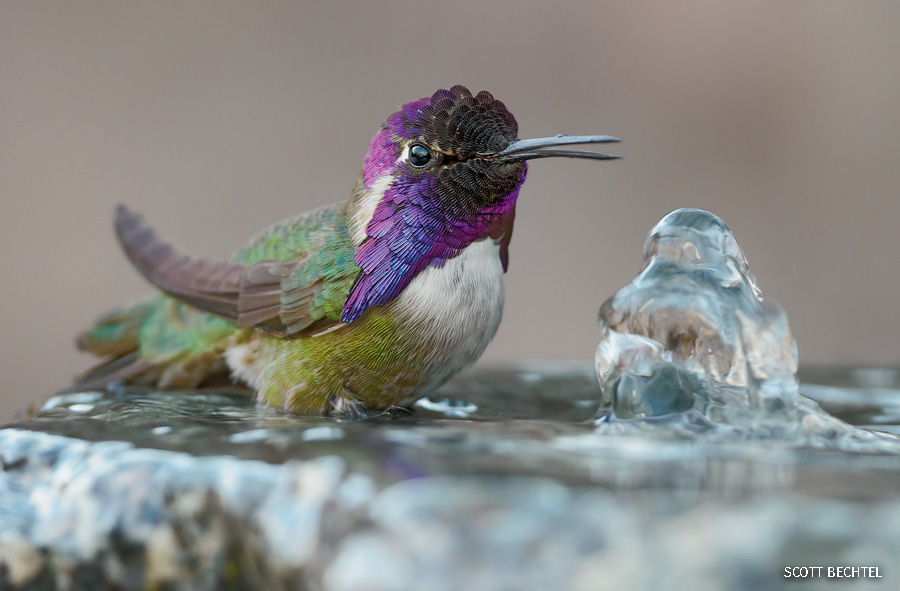
Because native plants attract mosquito predators, wildlife gardeners tend to have fewer mosquito problems than neighbors with turf lawns. Mosquito-munching allies may include : Costa’s hummingbirds (above), which, in addition to drinking nectar, consume hundreds of insects daily; green darners (below, top) and other dragonflies that eat mosquito larvae before the pests take wing; American bullfrogs (below, middle), whose long, sticky tongues are specialized to nab insects; and red-eared sliders (below, bottom), which, in one study, reduced mosquito larvae numbers in ditches by 99 percent.
Gardening for wildlife will attract many natural predators of mosquitoes. Dragonflies and damselflies, for example, are voracious mosquito eaters. Turtles, frogs and bats will also devour the insects as will many species of birds, from hummingbirds to woodpeckers, warblers and wrens.
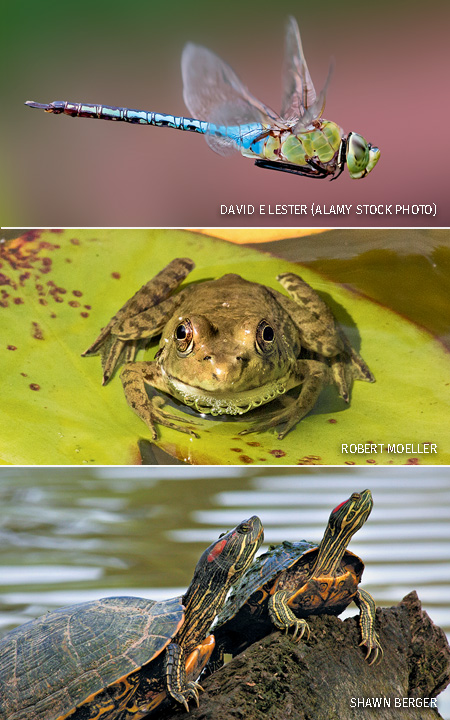
“Predators will never kill every last mosquito, of course,” says Mizejewski. “But the most-effective way for people to reduce their numbers is to target larvae, not spray adults.”
Even if you keep mosquitoes at bay in your own yard without spraying, when your neighbors use pesticides, you still will lose pollinators and other beneficial insects. “Let your voice be heard,” Mizejewski says. Talk to people who live near you. Write letters to the editor of your local newspaper. If your community has a neighborhood association, attend meetings and speak up. If possible, engage your city and county governments to encourage alternatives to spraying—such as introducing natural predators and parasites—as part of their mosquito-control programs.
Mizejewski stresses that such individual actions are important. Nearly 3 billion birds have disappeared from North America since 1970—in part due to the loss of their insect prey—and some insects are themselves vanishing at warp speed. “Pesticides are a significant contributor to all of these wildlife declines,” Mizejewski says. “How we fight mosquitoes at home really matters.”
Regular contributor Doreen Cubie controls pests naturally in her Certified Wildlife Habitat® in South Carolina.
Make Your Yard a Spray-Free Zone »
Habitat Help in the Age of Zika »
What You Need to Know Before Spraying for Mosquitos »
Take the Clean Earth Challenge and help make the planet a happier, healthier place.
Learn MoreA groundbreaking bipartisan bill aims to address the looming wildlife crisis before it's too late, while creating sorely needed jobs.
Read MoreMore than one-third of U.S. fish and wildlife species are at risk of extinction in the coming decades. We're on the ground in seven regions across the country, collaborating with 52 state and territory affiliates to reverse the crisis and ensure wildlife thrive.
